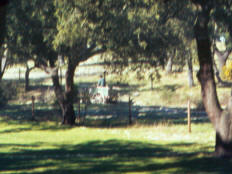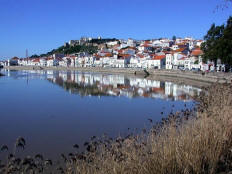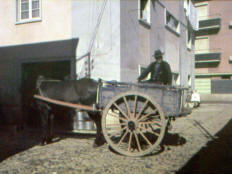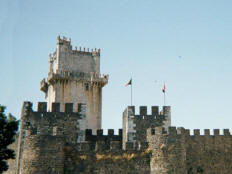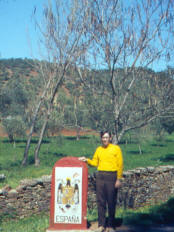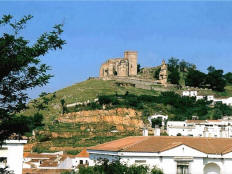Page 1 2 3 4 5 6 7 8 9 10 11 12 13 14
Monday, 3 April. Our bus left the hotel at 08:15 and headed south along the Portuguese coast. It was an interesting ride. We passed two gypsy camps and saw several of their carts on the road. There were groves of orange trees, numerous cork (oak) trees, windmills, and even fences made of cactus. We had a rest stop at Alcacer do Sal, a picturesque little town on a long estuary leading to the Atlantic. It is said to have been populated for 5000 years. Above the town sits the remains of a large fortress, once used by the Romans and later by the Moors.
At Grandola our bus turned west toward the Spanish border. We stopped for lunch in Beja,
another beautiful town with a rich Roman and Moorish history. It not only had a
fortress, but even an aqueduct. We were given a few minutes to walk around and
stretch our legs, but with firm instructions: no shopping. Then at 13:00 we met
for lunch.
By this time we began to notice a pattern at our group meals. Whenever anyone tried to order wine, they were shown a wine list of very expensive bottled wines. Local people at surrounding tables obviously were drinking the house wine, but the waiters refused to serve it to anyone in the tour group. This practice continued for every lunch and dinner until we reached Barcelona. Perhaps too cynically, I concluded that Mr. Lehmann, such a wonderful guide in every other way, was probably getting a cut on our beverage purchases. There was some basis for this conclusion. At the first stop where we were given time to shop, Mr. Lehmann led us all into a particular shop, which made it very crowded. When I said I thought we’d go to the shop next door, Mr. Lehmann discouraged me, saying this shop had better goods and prices. (I went next door anyway and found the same merchandise at the same prices.) A few minutes later, when all of us (except Mr. Lehmann) had gotten on the bus, I ran back into the first shop for something I’d forgotten. Mr. Lehmann was standing at the counter as the proprietor added up the stack of receipts from our group’s purchases, then handed him his cut. I knew this was standard practice, yet couldn’t help but be a little disappointed. Mr. Lehmann seemed so far above that sort of thing.
Nearing Serpa (last town in Portugal) we crossed the Guadiana River on an old, one-lane bridge that carried both cars and trains. Fortunately there was no other traffic, either cars or trains. Very shortly, we crossed the Chanca River and were in Spain.
Our first stop in Spain was Aracena, again with the ruins of a Moorish fort looming over the town. There was also a covered public laundry still in use. We spent most of our time in Aracena shopping in the many tourist stores. We bought a few ceramics and some carved wooden figures of the Three Kings. On leaving there, we passed a bull ranch. As we turned south again, the road became narrow and bumpy, the land hilly and desolate. It was nearly 21:00 by the time we finally got to the Hotel Tartessos in Huelva, once the home of Christopher Columbus. Everyone was worn out from the long drive, and there was little activity after dinner. [My original notes lists these as the places we passed through on this day: Setubal, Marateca, Alcacer do Sal, Grandola, Santa Margarida do Sado, Ferreira, Beja, Serpa, (Spanish border), El Rosal de la Frontera, Galaroza, Aracena, Campofrio, Riotinto, Valverde del Camino, Beas, San Juan del Puerto, and Heulva.]
Page 1 2 3 4 5 6 7 8 9 10 11 12 13 14
Copyright © 2000-2023 DarrellPeck.com All rights
reserved. | ||||||||



